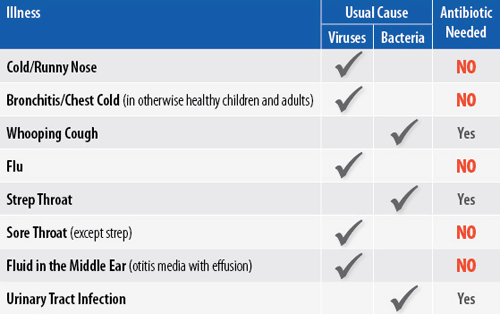“By far what [I] google the most,” Amy Schumer said in her SNL monologue this weekend, “is ‘Can I drink on these antibiotics?’ and ‘Do these antibiotics make my birth control worthless?’” Comedy aside, these are actually good questions — and ones most of us probably ask when we’re given that prescription. Here are some answers.
Illustration by Global Panorama
After all, 80% of us take antibiotics each year (according to the most recent data, from 2011). These drugs are powerful, common, and we don’t always know what’s going on in our body when we take them.
So…Can I Drink on These Antibiotics?
In most cases yes, but check the label.
A few antibiotics, including sulfonamide or “sulfa” drugs like Bactrim, interact badly with alcohol. They will give you flushed skin, nausea, and vomiting, even with just a drink or two — or perhaps even with the trace amounts of alcohol found in cough syrups. This won’t make the antibiotic less effective, but can make you feel really awful. So awful, in fact, that similar drugs are used as a treatment for alcoholism.
If you get a prescription for one of these drugs, there will be a warning about alcohol on the pamphlet that comes with it and probably also as a sticker on the bottle. You’re reading that stuff anyway, right?
Do Antibiotics Mess With Birth Control or Other Drugs?
Sometimes. There’s one antibacterial known to interfere with hormonal birth control: rifampicin (brand names Rifadin and Rimactane). You’re not likely to pick up a scrip at a routine doctor’s visit, though: it’s used for some less common infections like tuberculosis and meningitis. There is also an antifungal drug called griseofulvin that can affect the Pill too.
If you do take one of these drugs, use an additional non-hormonal method of birth control, like a condom, to be sure you’re still protected. Some other antibiotics, besides these two, come with a warning to use a condom anyway. We don’t know for sure if they will actually make pregnancy more likely, but when it comes to accidental pregnancies, better safe than sorry.
Other drugs can interact with antibiotics — rarely, but it’s possible. For example, macrolide antibiotics and statins can combine to cause heart problems. If you take prescription medications regularly, skim through this list of antibiotic drug interactions so you know what to expect.
Your doctor and pharmacist should both be keeping track of the medications you’re taking, but they only get the chance to do that if you tell them everything, and if their records are up to date. If your regular doctor has your medication records but you stop in to an urgent care clinic over the weekend for some minor ailment and don’t bother to give your full medication history, there’s no way the nurse or pharmacist (or computer!) at that clinic can flag a dangerous combination.
So make sure that when when they ask what meds you’re taking, you answer completely, including over-the-counter stuff and even herbal or dietary supplements. Or, at the very least, keep a list on your phone and when it turns out you will be going home with a scrip, share the list so they can double check.
Can I Be Immune to Certain Antibiotics? Z-pak Never Works for Me.
You can’t be resistant to antibiotics, but the germs that make up your infection can. If you get sick again another time, those will be different germs, and all previous bets are off.
This is different from an allergy. If you’re allergic to penicillin, your immune system will attack the penicillin as if it were an invading illness. The result: symptoms that may be anywhere between annoying and life-threatening. An allergy means that drug is off-limits for you, from now on.
But when an antibiotic just doesn’t work, that’s not a problem with you: it means the drug wasn’t effective against the germs that were making you sick.
Antibiotics kill bacteria, so they can’t work if your illness was caused by something else, like a virus. Or maybe you have a bacterial illness, but the particular bacteria that took up residence are ones that are resistant to the antibiotic your doctor prescribed. For example, azithromycin (Z-pak) is a doctor and patient favourite because it’s just five easy pills, but a lot of commonly circulating bacteria have become resistant to it. That could explain why it doesn’t work as often for you.
Ideally, your provider will find out what the creatures living inside you are susceptible to. If you’ve ever had a throat culture or a urine culture, that’s the idea here: they’re testing to see if they can grow the bacteria in the lab, and while they’re at it, they will try throwing a few common antibiotics at them to see which ones the germs are susceptible to.
It’s also possible that the antibiotics might work at first, but then either they pick up an antibiotic resistance gene (bacteria trade DNA with each other for funsies) or else the antibiotic killed off one type of germ only to create an opportunity for their resistant brethren. Call the doc and ask if you need another prescription.
Will Antibiotics Cure My [Insert Ailment Here]?

Antibiotics work against bacterial infections, but not viral ones. This handy chart from the CDC (shown above) sums up which infections are most likely to be bacterial: strep throat, whooping cough, and urinary tract infections make the list. The cold, flu, and sinus and ear infections are typically caused by a virus. That means antibiotics won’t work against them, despite being commonly prescribed.
Bacteria are little living creatures made of just one cell each. They’re smaller and simpler than the cells that make up our bodies, but they have many of the same parts: DNA, ribosomes, all sorts of cellular machinery to keep them alive and do the jobs they like to do — whether that’s making us sick, keeping us healthy, or any of a million things that don’t really concern us.
Viruses are not so complex. They’re little packages of DNA (or RNA) and protein, and they just wait until some other cell finds them and reads the instructions written in their DNA — which say something like “Make more of me and kill yourself!” Oops.
Antibiotics that kill bacteria are useless against viruses.
There are antiviral drugs, including one that may work against the flu, but they don’t work on most ordinary illnesses like coughs and sinus infections. For those, a responsible doctor will send you home without any drugs. Instead, rest up, take care of yourself, and ride it out — antibiotics won’t help against a viral infection.
But if the Doc Gave Me Antibiotics, Doesn’t That Mean I Need Them?
Sadly, no: half of outpatient antibiotic prescriptions are probably unnecessary, according to the Centres for Disease Control and Prevention. Docs may hand out antibiotic prescriptions because patients ask for or expect them. They may also prescribe when they aren’t sure if an antibiotic is needed, or they may be following old guidelines that were more free in their use of the drugs.
Unfortunately, too many antibiotics can lead to more resistant infections in the future (in you or in other people). They can also kill off our healthy bacteria, leading to yeast infections and diarrhoea. And then there are side effects, drug interactions, and the possibility of developing allergies — all of which can occasionally become serious. So the best approaches, we now know, avoid using antibiotics except where they’re really necessary.
Most of the run-of-the-mill illnesses that will bring you to a doctor can’t be helped by antibiotics, including sinus infections, coughs, and runny noses. For the few that can, like strep throat, in most cases your provider should test before prescribing to make sure that it’s bacterial and to find out which antibiotics it will respond to.
You can help your doctor by telling them up front that you prefer not to take antibiotics unless they’re absolutely necessary. One strategy that helps both of you, if the need for antibiotics is iffy, is to take a prescription home to be filled later, depending on how you feel. I find doctors often seem relieved when I tell them that’s what I’d prefer — and often I don’t need to fill the prescription at all.
Should I Be Taking Probiotics?
Since antibiotics kill off good bacteria along with the bad, probiotics — good bacteria in food or pill form — should be able to relieve some of the diarrhoea and other symptoms that go along with a course of antibiotics. You’re not guaranteed to get results, but snacking on yogurt won’t hurt, and might help.
What Happens If I Don’t Take All My Pills?
You’ve seen the warnings on the pill bottles: “Finish all of this medication unless otherwise directed by prescriber.” That’s meant to combat antibiotic resistance: If the bacteria are all susceptible and you kill them off quickly, they won’t have a chance to pick up a resistance gene. Or if a few of them are resistant already, the antibiotic can kill off the susceptible ones while your immune system picks up the stragglers.
What’s worse is if you take a pill or two, killing off the susceptible germs but leaving a population of resistant ones to grow. Repeat this a few times, and you’ve just given those resistant germs an evolutionary boost. That’s why you’re supposed to take a nice long course of pills that keeps poisoning the germs long after you feel better: it’s one way of being a good citizen and improving the chances that the antibiotics will still work for the next person who takes them.
Still, it’s a strong recommendation, not a commandment. If you’re developing an allergic reaction or a serious side effect, call your doctor’s office and let them know. They will probably tell you to stop taking it, and maybe call in a new prescription.

Comments
3 responses to “Your Burning Questions About Antibiotics, Answered”
Metronidazole (trade name Flagyl in Australia) is another commonly used antibiotic that shouldn’t be combined with alcohol http://www.nhs.uk/chq/Pages/864.aspx
Burning questions on Antibiotics.. will this antibiotic cure my burning?
i tend to avoid antibiotics, from the point of view of it killing of the good bacteria as well.
thankfully i dont end up any many situations where i actually need them and i take them when im in a really bad state. but i have found that they get over prescribed and usually arent that great for you for things that you can stave off with rest and healthy eating.